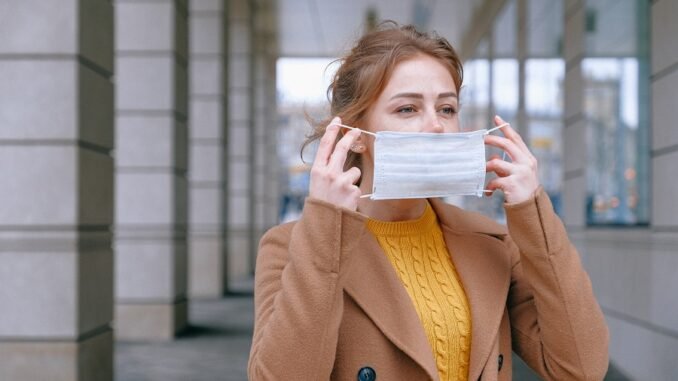
There’s probably nothing fundamental that can be done to magically halt Lithuania’s slide into black pandemic autumn and winter. The country will just have to survive and hope that some new, even more, the threatening strain of the coronavirus won’t attack, Vytautas Bruveris wrote in lrytas.lt
Thus, the endless disputes and bickering among politicians on details in pandemic management are only the fig leaf covering an uncertain future and imitating active engagement.
This week, the cabinet once more introduced a mandatory requirement to wear masks indoors and insistently recommended to work remotely where possible.
The cabinet could have announced this decision before but suddenly decided to postpone it for a week. Supposedly, it was found that a lockdown regime might not be necessary for such a solution, it is enough to remain in the current emergency situation. Then, on Tuesday, Prime Minister I. Šimonytė announced that the cabinet’s attorneys uncovered over a week that the lockdown regime was indeed not necessary.
So why the threats of a new lockdown and a week’s intermission for the legal team’s deliberations? Could they not figure it out first and then talk?
Especially when already last week, some ministers said in unofficial talks that there would be no lockdown. This is firstly due to political motives. Because just the word “lockdown” would mean that the government would admit it no longer controls the situation and has lost.
Some said that this is a usual tactic of the ruling bloc – intimidate first and then look how the public and other politicians respond.
Others said that this is an indication of general upheaval within the government. Perhaps even friction between the ruling bloc’s Freedom Party and the Conservatives, with the former, as usual, opposing any increased restrictions.
One way or another, most political experts agreed that such manoeuvres only serve to further irritate the public, create the impression that the government is confused.
It’s natural that the opposition didn’t miss the opportunity to jab at the ruling bloc.
I. Šimonytė, who receives so many letters from “Farmer” leader and shadow prime minister R. Karbauskis that she could heat her home with them, also received correspondence from the proclaimed shadow vice prime minister and former Minister of Healthcare A. Veryga. The latter reiterated R. Karbauskis’ accusations to the prime minister that she is trampling on democracy and the law because she does not respect the shadow cabinet, describing it as an informal gathering.
A. Veryga also presented public accusations to the prime minister and Minister of Healthcare A. Dulkys of not only failing to handle the situation but also cheating.

The former minister, who himself doubted the use of a lockdown last autumn, declared that a lockdown must be imposed now as a legal regime. Supposedly, the government won’t do it so as to not pay extra funds to medical staff. However, the ruling bloc presented arguments rejecting such musings.
However, the “Farmers” and others in the opposition, including S. Skvernelis, who admitted to plans of creating a party so as to receive budget funding, continued to lash out at the ruling bloc, describing it as being the main cause of the worsening situation.
The government was also reprimanded over something it is constantly blamed for by the Presidential Palace – a supposedly belated and failed vaccination campaign.
The S. Daukantas Square Palace thundered at the cabinet this week as well – the Presidential Palace named A. Dulkys as the main scapegoat for poor management severely as never before.
Who knows, perhaps G. Nausėda will finally call for the head of this constantly criticised minister, whose head the opposition has long demanded?
Meanwhile, the “Farmers” even invited the new star of the anti-government and anti-vaccination camp, the leader of the lawyers, I. Vėgėlė, to the podium of the Seimas opposition agenda.
He declared that both the passports of opportunity and the government’s entire anti-pandemic effort are illegal.
With the imposition of mandatory mask-wearing indoors, some experts who don’t normally deal with politics have also spoken up about how the passport of opportunity is losing meaning in many senses.
Across this spectrum of disputes, accusations and calls to “do differently”, the opinion of individual experts is drowned out in that there simply is no single panacea that can save us all and that we must continue vaccination as soon as possible in the hopes that we will not have to lock the country down again. As if there weren’t enough problems related to the pandemic, the shadow of another crisis looms on the horizon – prices.
During talks on what leads to the increase in gas and electricity prices the most – global trends or internal factors – the top government officials also budged.
The cabinet announced that it will halt the growth of prices by setting a ceiling for it. Experts criticised such plans right away – supposedly, these are just declarative political rituals, which will nevertheless fall on the people’s shoulders.
According to economists, the price increase is related to global trends, as well as how the heating infrastructure in Lithuania is dependent on natural gas. This is clearly indicated by the example of Vilnius where heating prices will increase perhaps the most.
Meanwhile, the head of state is opposed to price increases. As often happens, the Presidential Palace rushed to demonstrate leadership in this new struggle, also urging to postpone the deadlines for electricity market liberalisation.
In any case, this situation sees the emergence of a new front in not only combatting crises but also politicians competing over their management.
To what extent such political bickering and attempting to come out on top will help contain the crisis is best portrayed by the unrestrained pandemic.
Lithuania finds itself atop all European Union countries in terms of infection rates and deaths from COVID-19.


Be the first to comment